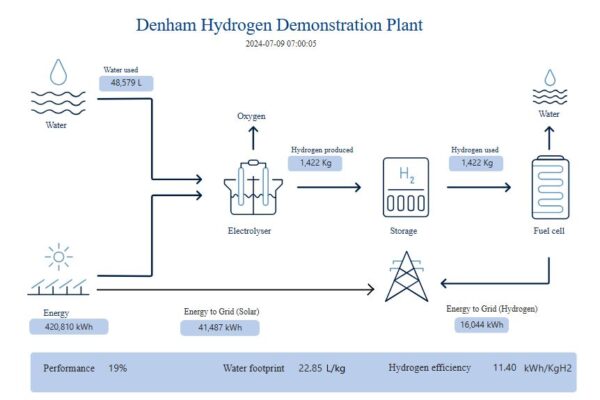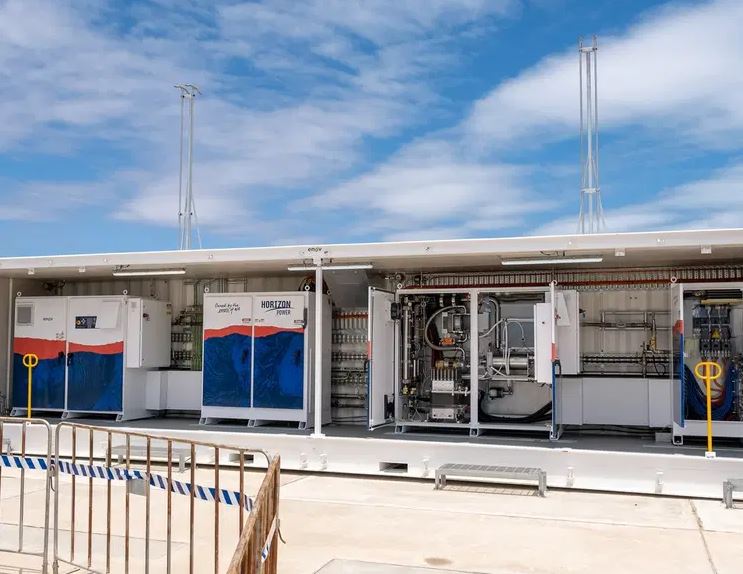The Western Australian government has released a report sharing lessons learned during the commissioning and operation of the first-of-its-kind solar and green hydrogen microgrid now operating in the coastal community of Denham, approximately 800 kilometres north of Perth.
The plant is Western Australia’s first renewable hydrogen microgrid and includes a dedicated 704 kW solar farm, two 174 kW electrolysers with accompanying compression and storage, and a 100 kW fuel cell that can be used to deliver electricity when it is needed.
This is connected to Denham’s existing stand-alone power system, that includes a separate 640 kW solar farm, a 1.5 MW / 1.7 MWh battery energy storage system, a wind turbine and a 2.6 MW diesel-fired generator.
The solar and renewable hydrogen system is expected to generate 526 MWh of renewable energy per year, of which at least 220 MWh will be provided by renewable hydrogen. The plant is expected to produce an estimated 13,000 kilograms of green hydrogen per year that will serve as a dispatchable power source.
It is anticipated the hydrogen will cut the use of diesel in the town by 140,000 litres a year.
The Public Knowledge Sharing Report prepared by Western Australian regional and remote power provider Horizon Power highlights the challenges faced by the engineering, procurement and construction contractor, including having to “develop most deliverables from scratch” due to the unique nature of the project.
It also reveals that developing a control program with a high level of maturity to manage the dispatch of the electrolysers and mitigate the volume of energy consumed from other sources was a critical achievement for the success of commissioning.

Image: Horizon Power
Horizon said the lessons learned during the delivery of the Denham microgrid will extend the knowledge and technical capability of hydrogen operating systems and test how to integrate and deploy the technology into electricity systems across WA and the rest of the nation.
The state-owned utility said the purpose of the system is not to produce as much renewable hydrogen as possible, or to optimise for minimal costs ‐ instead it is to prove that hydrogen storage systems can be used as a viable means to store excess renewable energy and return that energy to a power grid, thereby ‘time shifting’ the renewable energy.
“The use of hydrogen to capture and store excess renewable energy and then return that energy to the electricity system provides a viable alternative to the continued consumption of diesel,” Horizon said.
“[It] also provides an energy storage mechanism that may compete favourably with batteries.”
WA Acting Energy Minister Dr Tony Buti said the Denham project is a breakthrough for the use of hydrogen as a fuel that could back up renewable energy when the wind was not blowing or the sun was not shining.
“This report confirms the great opportunity for hydrogen to play a role in our state’s energy transition,” he said.
“As we retire state-owned coal-fired power and embrace renewable energy, hydrogen could play a key role in powering our state while creating jobs and business opportunities through new export markets.”
“By displacing diesel with hydrogen in Denham, our government has also demonstrated how this technology could specifically benefit regional communities that are connected to microgrids.”
Horizon said it will continue to monitor the performance of the Denham plant and track operation and maintenance requirements for improvements over the next 12 months with the learnings and knowledge gained to be shared with industry.
This content is protected by copyright and may not be reused. If you want to cooperate with us and would like to reuse some of our content, please contact: editors@pv-magazine.com.









6 comments
By submitting this form you agree to pv magazine using your data for the purposes of publishing your comment.
Your personal data will only be disclosed or otherwise transmitted to third parties for the purposes of spam filtering or if this is necessary for technical maintenance of the website. Any other transfer to third parties will not take place unless this is justified on the basis of applicable data protection regulations or if pv magazine is legally obliged to do so.
You may revoke this consent at any time with effect for the future, in which case your personal data will be deleted immediately. Otherwise, your data will be deleted if pv magazine has processed your request or the purpose of data storage is fulfilled.
Further information on data privacy can be found in our Data Protection Policy.